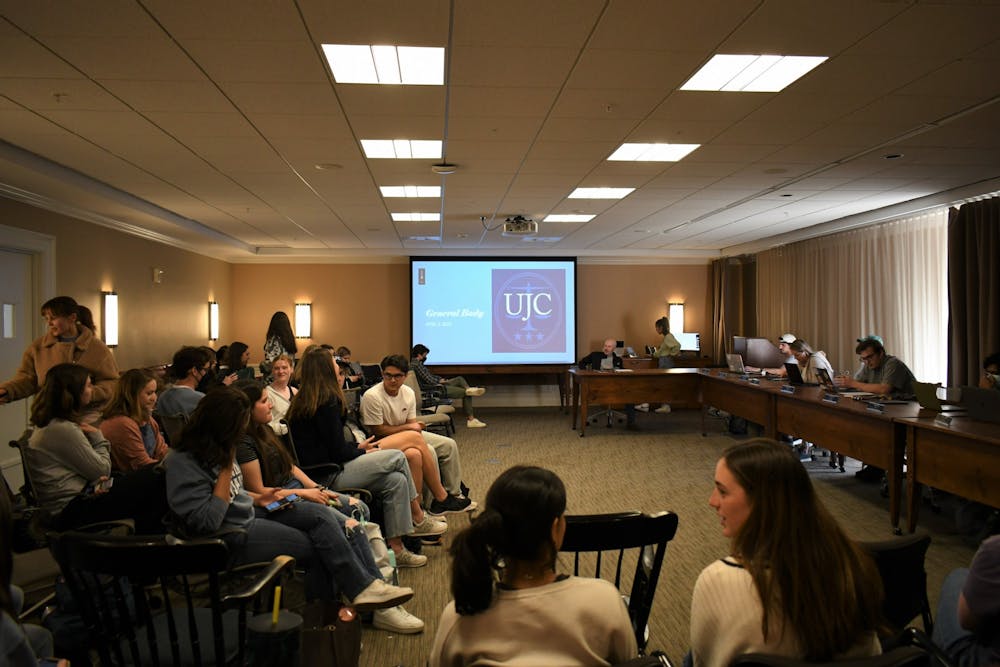The University Judiciary Committee met Sunday to introduce newly-elected Executive Committee members for its 2022-2023 term, which began April 1. UJC is a student-run organization responsible for investigating and trying alleged violations of the University's Standards of Conduct, which lists 12 prohibited behaviors aimed at facilitating a community of safety and trust.
The Executive Committee consists of 12 members who oversee the trial process and manage the UJC’s operations. Nabeel Raza, chair of UJC and third-year College student, will preside over the term and began Sunday’s meeting by inviting the new Executive Committee members to introduce themselves.
Third-year College student Peyton Hamlett will serve as vice chair for trials. Hamlett explained that his goal is to expand the vice-chair for trials’ administrative duties by putting effort into promoting unity among the students of all years who serve as judges for UJC trials.
“[Judging trials are] very unique opportunity for undergraduate students as well as graduate students to get to know each other and learn from each other and grow,” Hamlett said.
Lisa Kopelnik, first-year College student, will serve as vice chair for sanctions. Kopelnik said hse views her role as one focused on training and guiding the judges who determine sanctions for students determined guilty in trial. The position requires both ensuring sanctions are enforced and helping to accomodate students and organizations through completing the sanctions by clarifying expectations and setting deadlines.
In contrast to the University’s Honor Committee — the group responsible for trying cases violating the pledge not to lie, cheat or steal — UJC utilizes a multi-sanction system. During each trial, judges craft individualized sanctions aimed to effectively mend the situation and facilitate personal growth of violating parties. According to the UJC’s bylaws, sanctions may include oral admonition, disciplinary probation or community service, among other consequences.
Looking ahead, Kopelnik said that she hopes to hold UJC accountable to doling out fair sanctions first by analyzing past sanctions.
“I plan to evaluate whether there are holes or gaps in UJC sanctioning methods, and generally to make the system more transparent to the public and to everyone in the committee,” Kopelnik said.
Sidney Matlock, vice-chair for first years and third-year Education student, outlined her role’s job of recruiting next year’s 12 First Year Judiciary Committee representatives and leading the group.
The FYJC, made up entirely of first-years, tries cases involving other first-year students. FYJC serves as a subsidiary of the UJC with the intention of providing fair trials to first-years as judges and investigators can best relate to the unique experiences of their first-year peers.
“I'm really looking forward to hopefully getting a really diverse and representative sample of first years from the new upcoming class,” Matlock said. “And then also having more trainings that directly relate to a lot of the first year cases we get, like alcohol, Wahoo Well and Recovery Ally training.”
Used as possible sanctions for cases involving substance use, Recovery Ally Training pairs students recovering from substance use with a mentor, while Wahoo Well provides meetings that promote well-being.
Viranga Wimalasiri, vice-chair for graduate students and fourth-year College graduate student, spoke of his mission to build community between the undergraduate and graduate representatives.
“My hope is to … communicate more and actually make some pools together so that everyone can get an idea about the pools we use.” Wimalasiri said.
Tessa Wright and Priya Viswanathan, third-year Batten students, will serve as senior counselors on the Executive Committee for the upcoming term. Counselors are responsible for providing advice to accused students, and Wright and Viswanathan said that they aim to connect the counselor pool with other pools, especially the investigator pool. Investigators research and compile evidence of claims for the trial. There are currently 15 Counselors and 26 Investigators, positions for which any student regardless of school of year can apply for at the beginning of each fall semester.
Wright and Viswanathan also explained their goal to promote connections within the counselor pool itself.
“We want the counselors to know each other better and to use each other as resources when we're working on cases,” Wright said.
Anticipating that the upcoming year will be the first fully normal semester following the COVID-19 pandemic, Laura Skillin, senior educator and second-year College student, said that she hopes to expand the Educators’ efforts across the University.
The educator group strives to connect the UJC with the greater community by educating students about the standards of conduct and promoting the UJC as a resource.
“I definitely want to reach out, expand a lot of our outreach to the incoming first years and just across the University in general to have a more representative pool of educators,” Skillin said.
Melinda Wong, senior data manager and first-year College student, concluded by saying that although much of the UJC’s data tracking occurs outside of public knowledge due to the confidentiality of individual cases, she aims to increase the UJC’s transparency through other means, but did not specify what actions this would entail.
“I hope to really increase transparency, accessibility and accountability across the UJC through all the different little things I do,” Wong said.
Raza ended the meeting by thanking all members for their work on this semester's eight UJC cases and two FYJC cases. He announced that UJC will publish an end-of-semester case report with summary statistics of individual cases and additional details for cases against University organizations.
“We had a pretty healthy load [of cases], and we also had a lot of them in a span of few weeks,” Raza said. “So great job to everyone.”







